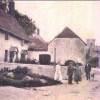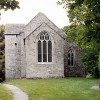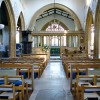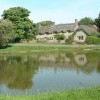18 Houses Destroyed – Over 100 Homeless
On Tuesday 26th September 1865 at Evershot a fire destroyed eighteen houses, the property of the Earl of Ilchester, making more than one hundred people homeless. The houses were in Summers Lane and the main street: the residents living in Summers Lane lost nearly all their possessions the people on the main street were more fortunate having time to salvage some of the contents of their homes before the fire took them. The wind carried the flames and sparks across the narrow road on to a barn and slaughterhouse occupied by Mr. Trenchard a butcher.
Reporters from ‘The Western Gazette’ and ‘The Western Flying Post’ ascertained from enquiries on the spot that the fire was started by hot ashes being placed in a back house connected to the premises occupied by Mr. English, a carpenter. The flames were discovered about one o’clock in the afternoon “the whole house being almost instantly enveloped in flames.” The neighbouring houses with their thatched roofs as dry as tinder, the result of a long drought, it was clear that the whole of the lower end of the town was in danger of being engulfed in the fire.
Police Constable Hare was on the scene almost immediately and despatched messengers for the two fire engines kept at Melbury House. Telegraphic messages were sent to Yeovil for more fire engines and to Dorchester for police officers. ‘The Western Gazette’ reported “ The request for the engines reached Mr. Bradley, the Captain of the Yeovil Volunteer Fire Brigade, at a quarter past two, and his engine started in fifteen minutes after its receipt, and reached Evershot in 45 minutes” drawn by four of Mrs. Bulleu’s best horses. Before its arrival a change in wind direction had driven the flames across the main street and “house after house fell victim to the flames” making both the main street and Summers Lane impassable.
The heat was so great that it was impossible to approach any of the burning premises. ‘The Western Gazette’ reporting “It seemed probable that the fire would sweep up both sides of the street, and wipe Evershot out altogether. It was only by dint of the most strenuous and well-directed exertions of those in charge of one of the Melbury House engines, and of the Yeovil Brigade engine, that this catastrophe was averted, and the fire confined to the lower end of the village.”
It being agreed that attempting to extinguish the fire in the houses where it was already raging was useless all the efforts of the firemen were directed to cutting off the flames and preventing the fire spreading down the street. Fortunately there was an abundant supply of water in a stream only a hundred yards or so away. By keeping the houses next to those which were burning completely saturated with water, the firemen finally got control and saved the rest of the village.
The names of the families of those persons made homeless: Charles White, labourer; George Brett, tailor; E. Rutley, labourer; T. Frampton, labourer; A English, carpenter; S. Christopher, butcher; W. Groves, labourer; J. Groves, shepherd; J. Childs, labourer; J. English, labourer; J. Tompkins, labourer; J. Groves, gamekeeper; A Sartin, widow; J. Perrett, cooper; S.Chubb, shopkeeper; J. Edwards, bootmaker; E Knell, tailor; S. Jessop, labourer and Mr Trenchard, butcher, lost his barn and slaughterhouse.
The buildings were uninsured presenting the Earl of Ilchester with a substantial loss. Mr Chubb’s stock and furniture were insured but his loss still amounted to £100. The local newspapers reported “A body of police soon arrived from Dorchester; and under Supt. Brown, who happened to be in the village, and Sergeant Vickery, they rendered valuable assistance.” No life was lost nor was anyone injured.
Those reporting the event were quick to comment on the way the community all pulled together regardless “to class or station.” Singled out by the Press for particular praise were the following individuals:Mr. Baskett, solicitor; Mr.Martin; Mr Baring, the Earl of Ilchester’s steward; the Rev.Greenhill, Mr Clapcott and Mr.Forward; and the Rev. Collins, the clergyman of the parish, and his wife and daughters, were seen handing to each other the buckets of water for the engines. Mr. Clapcott, Mr.Collins Mr.Martin and others, opened their houses and provided refreshments for all that needed them.
The following week the local press was still following the story but by now it was the darker side of human nature they had to write about. “Blankets and bedroom carpets, which had been saved from the fire disappeared most mysteriously, and the contents of a butt of cider, the property of Mr. S. Christopher, which had been removed to Mr Knell’s garden for safety, were likewise stolen” ‘The Western Gazette’ continued “ We trust that the heartless wretches who took advantage of this great calamity to rob their neighbours may be speedily brought to justice.”
By early morning on the Sunday following the disaster it was reported that from 600 to 1,000 people, the inhabitants of the neighbouring towns and villages, had come to see the scene of the fire. In the evening the church was crowded and many strangers were present. The Rev. E. Collins selected his text from the first verse of Proverbs chapter 27.“For thou knowest not what a day may bring forth.”



